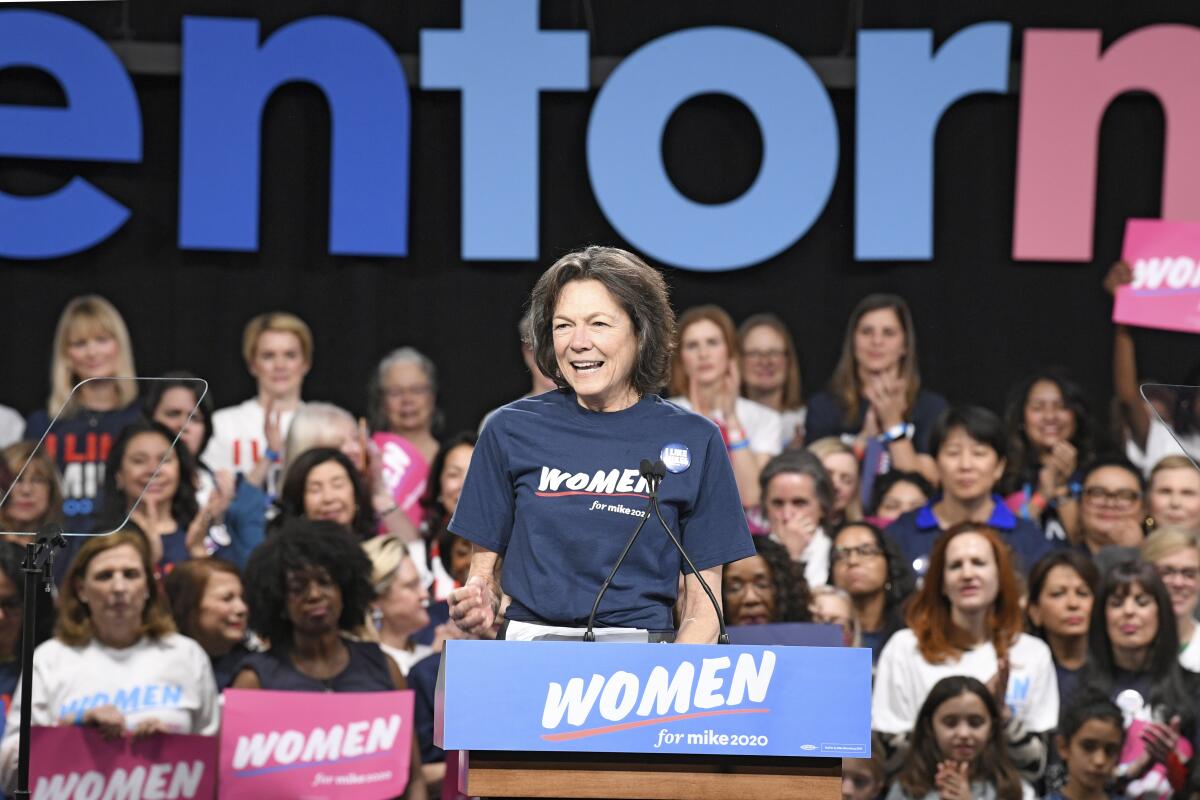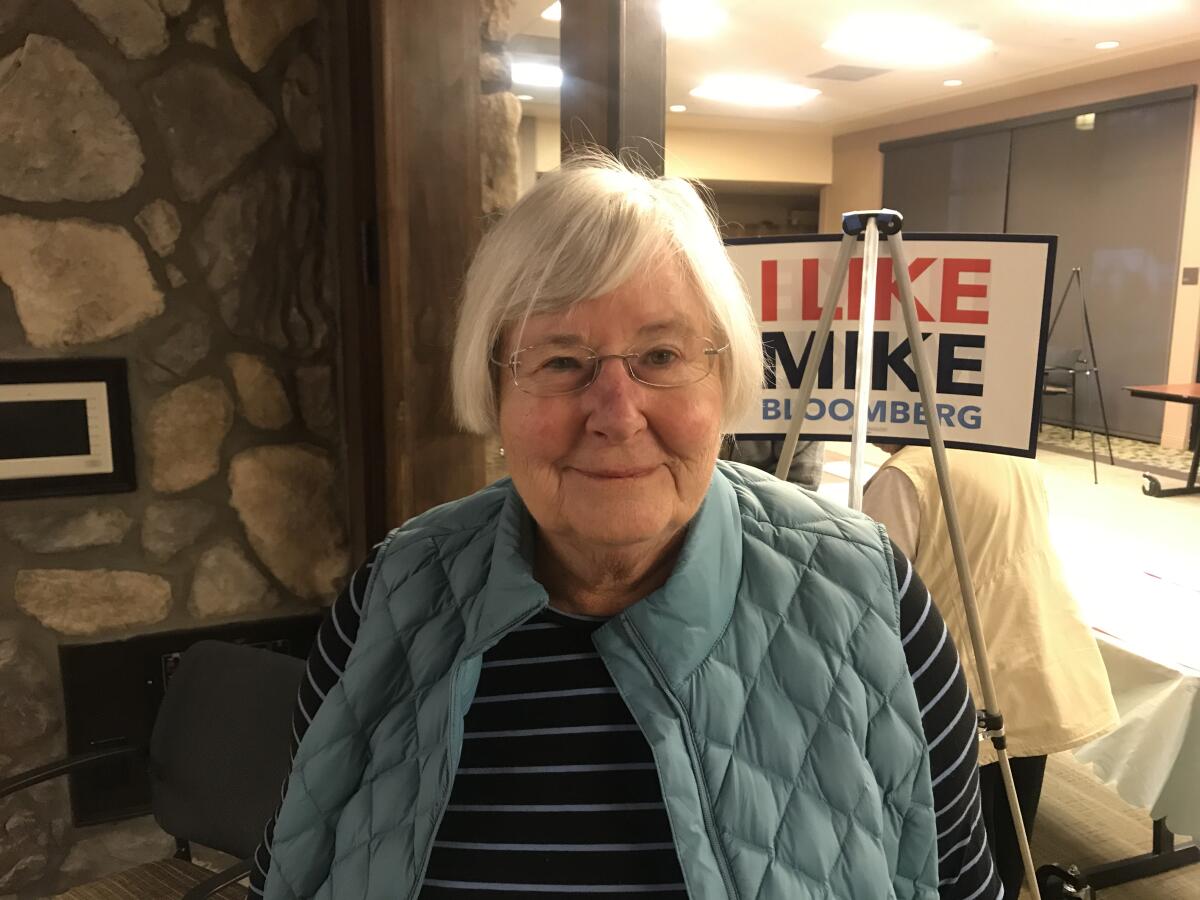Bloomberg’s fraught history with women threatens to undermine his candidacy

- Share via
WALNUT CREEK, Calif. — Michael R. Bloomberg has blanketed the airwaves with commercials for months, but last week, he added a new one to the mix. Its intended audience was not subtle.
As a lilting piano score plays, woman after woman testify how wonderful it was to work for the media mogul and former New York City mayor.
“Mike supports women,” one former colleague said. “He promotes women and he respects women.”
Any Democratic presidential contender would be wise to make an appeal to female voters, who make up nearly 60% of California’s primary electorate. But for Bloomberg, who faces his first electoral test on Super Tuesday — when 14 states including California hold primaries — the outreach has taken on fresh urgency after wobbly debate performances that highlighted allegations of his past treatment of women in the workplace and chipped away at the veneer of electability that is the rationale for his campaign.
The assurances from women close to the 78-year-old billionaire may help.
Nega Flaherty was among several hundred people who came to see Diana Taylor, Bloomberg’s longtime partner, speak at a Democratic club in Walnut Creek. Flaherty had written off Bloomberg after his rivals piled on him in his first debate in Las Vegas. Seeing Taylor, a self-made business executive, made her reconsider.
“You just sort of wonder, if that’s his partner, how can the same man be saying those nasty things that he is alleged to say,” said Flaherty, 77. “That was very persuasive.”
But interviews with other women across California suggest an uphill climb for Bloomberg, which could seriously undermine his candidacy.

Energized in response to President Trump’s win in 2016, women have become an increasingly influential voting bloc. Nearly 3 in 10 women say they’ve increased their political involvement in recent years, according to a December poll commissioned by the Barbara Lee Family Foundation and the Women & Politics Institute at American University.
Women, particularly swing voters living in the suburbs, were decisive in helping Democrats win the House of Representatives in 2018.
“These are healthcare voters, [gun] safety voters, education voters,” said Celinda Lake, a Democratic pollster who specializes in women voters.
Bloomberg spent his post-mayoral years pouring hundreds of millions into advocacy on those fronts, in addition to combating climate change, another top issue for women voters.
In theory, that could make him a perfect fit for a voter like Bethany Webb.
Webb ranks the environment and gun violence prevention as top issues; the latter especially so after her sister was killed and her mother injured in a mass shooting in Seal Beach eight years ago. She threw herself into ousting incumbent GOP Rep. Dana Rohrabacher from his Orange County district in 2018. Bloomberg spent more than $4 million on television ads supporting the Democratic challenger, Harley Rouda, who ultimately won.
But while Rouda endorsed Bloomberg’s presidential bid in January, Webb can’t get behind his pick. She is turned off by Blooomberg muscling his way into the race via his limitless checkbook.
“As long as Trump is not president, I will feel relief,” Webb, 58, said. “I will not feel pride if it is Michael Bloomberg.”
Webb, a loan officer from Huntington Beach, said she enjoys watching Bloomberg needle Trump with New York gusto.
“I just wish he’d do that without running,” she said.
The former mayor had been steadily climbing the polls, aided by his advertising blitz and early losses by moderate front-runner Joe Biden.
Then came his first debate.
He was broadsided by Sen. Elizabeth Warren, who highlighted coarse comments he had purportedly made about women. She slammed his media company’s use of secretive legal settlements to prevent female employees from speaking publicly about allegations of sexual harassment and gender discrimination.
His performance thudded with voters. Favorable views of Bloomberg among women dropped 11 points after the debate, according to Economist/YouGov polling, and unfavorable views rose by 15 points. Men had a similarly adverse reaction.
“It sounded good when he was on paper and TV only, but once they met the real deal, they changed their mind,” said Shawnda Westly, a former executive director of the California Democratic Party who is not working for a presidential candidate.
Bloomberg said he would release three women from nondisclosure agreements regarding comments he allegedly made. He also said his media company, Bloomberg LP, would no longer require confidentiality in settlements concerning sexual harassment or misconduct.
Fatima Shama, who held several senior positions in his mayoral administration, described the accusation of sexism as “slander.”
“The misrepresentation of that on the stage could not have been more gross to me,” said Shama, who now works for the campaign.
Taylor, Bloomberg’s partner, has also stepped in to combat any perceptions of sexism. At times, she has appeared dismissive of concerns over his behavior.
“It was 30 years ago. Get over it,” she told CBS News, a statement that Bloomberg’s campaign later clarified was her personal view and it did not represent the campaign’s stance.
During her stops in California, Taylor struck a more reflective tone, reminiscing about the start of her own career in the 1980s, describing going to off-site meetings held at men’s only clubs, where the women had to enter through a back door to participate.
Her recollections resonated with attorney Rhett Currier, who grew up in New York City and now lives in the hills above San Francisco.
“There was just unbelievable sexism going on, so I can understand that might have been around him,” Currier said.
Currier, who is leaning toward backing Bloomberg, said she wanted to know if any allegations were from the more recent past.
“I don’t think you’re going to find a pattern with Bloomberg, I really don’t. My spidey senses don’t go off,” she said, channeling Spider-Man.
Mason reported from Huntington Beach and Mehta from Walnut Creek.
More to Read
Get the L.A. Times Politics newsletter
Deeply reported insights into legislation, politics and policy from Sacramento, Washington and beyond. In your inbox three times per week.
You may occasionally receive promotional content from the Los Angeles Times.












